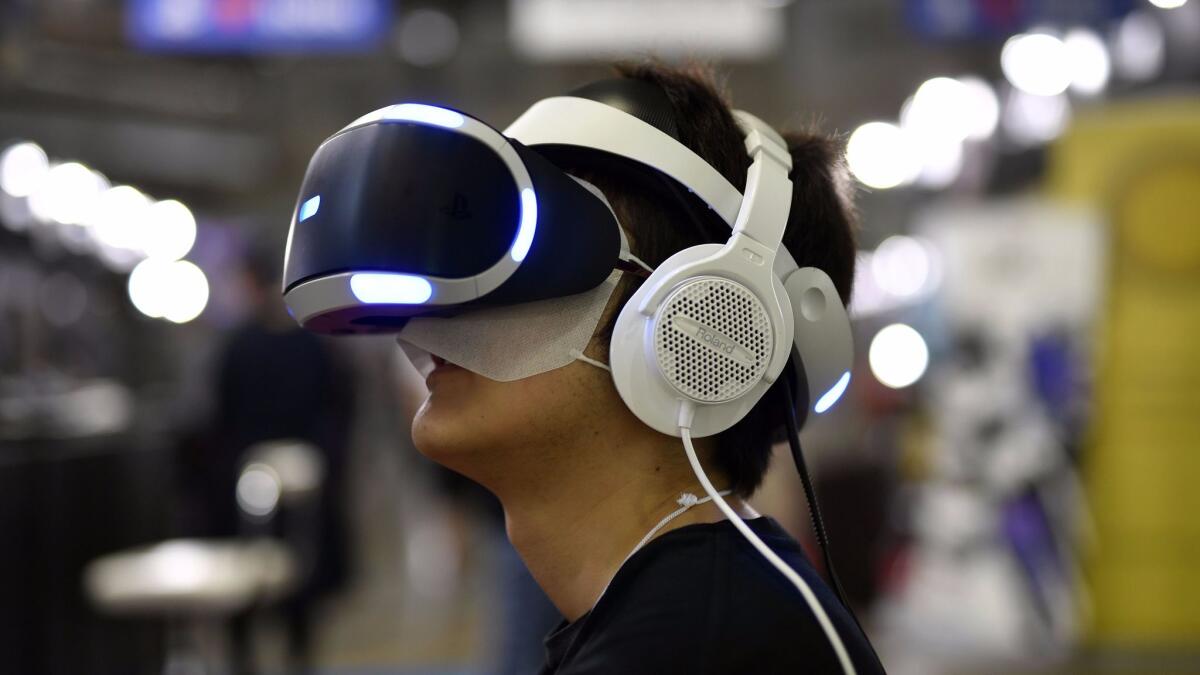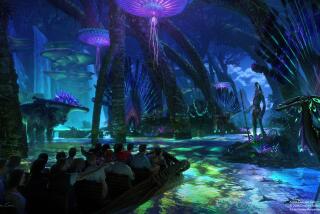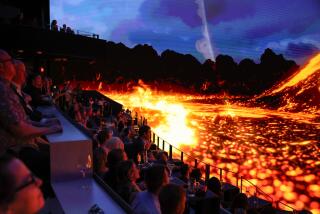Hoping to bring VR to the multiplex, AMC joins Spielberg in backing Culver City startup

In a bid to popularize virtual reality without that pricey headset purchase, some of Hollywoodâs biggest names are teaming up with the nationâs largest theater chain.
Dreamscape Immersive, the Culver City-based company co-founded by veteran producer Walter Pâarkes and financed in part by filmmaker Steven Spielberg, has raised $20 million from AMC Entertainment, the companies announced Tuesday, along with an additional $10 million from other parties.
The theater chain will also finance up to six location-based VR centers as either standalone venues or in existing AMC multiplexes in the U.S. and United Kingdom. âThe hope is that mainstream consumers will flock to the spaces to sample the technology they have thus far largely stayed away from at homâe.
âWe believe people may not want to buy âa headset for $750. But they do want to try VR for $15,â Parkes told The Times in an interview.
Of the $20 million raised from AMC, half will go to Dreamscapeâs content efforts, while the other half will enter the companyâs main coffers as part of a $20-million Series B financing.âThe source of the remaining $10 million in the Series B round was not disclosed.
The cash influx comes after Dreamscape in an earlier financing round raised $11 million from a group of entities that includes Warner Bros., Fox, MGM, Imax and Spielberg.â
Dreamscape content, which will include a certain amount of interactivity, will be produced both in-house and by third parties and is expected to be announced in the coming months. The companyâs experiences, across a number of established commercial genres, are meant to be undertaken with other people -- up to five partners - who appear as full-sized avatars.â In addition to headsets, sensors are worn on the hands and feet to track users, allowing them a large degree of motion around a circumscribed space.
Dreamscape, which has about 25 full-time employees, began when âthe mega-concert producer Kevin Wall (Live Earth, Live 8) and his executive Aaron Grosky saw the multi-user installation âReal Virtualityâ at Sundance in 2016. The large-scale piece, from the Swiss foundation Artanim, impressed many attendees with its rich texture, full body movements and homage to classic cinema.
The pair teamed up with former DreamWorks chief and film producer Parkes (âMen in Black,â âMinority Reportâ)â with whom they were already exploring immersive theater ventures. The group subsequently acquired Artanim as a subsidiary -- a piece related to âReal Virtualityâ is likely to form part of its content slate -- and hired as CEO the former Walt Disney Imagineeringâ chief Bruce Vaughn, a specialist in designing large-scale theme-park attractions.
Dreamscapeâs aim is to give the full spectacle of a Disney attraction at a fraction of the cost -- both to consumers and to itself.
âIf we wanted to build some of what weâre doing it would cost $400 or $500 million, if we could do it at all,â said Vaughn in an interview. âBut in VR, we could do it easily.â
Grosky notes that the virtues of a Live 8-style concert can be imported into the social experience of a Dreamscape VR piece as well. âWe want to give the user something special that they can say, âI was there,ââ he said., ââand I experienced it with other people.ââ
The fixed location of Dreamscape differentiates itself from other VR companies, such as Chris Milkâs Within and Felix & Paul Studios, which aim to provide content for numerous home-based headset systems.
Dreamscape, in contrast, is counting on slow head-set adoption but high curiosity levels to propel consumers to give the technology a go at movie theaters and other public venues --much in the way the theatrical film experience preceded and in many ways stayed dominant over home-video for decades in the movie business.
A deal with AMC gives it a foothold to do that.
For AMC, meanwhile, VR installations at its theaters offer another draw for consumers -- and a new potential revenue stream -- at a time when box office has been sagging. AMC President and CEO Adam Aron noted in a statement that he believes Dreamscape will prove a form of âcinematic storytelling that is sure to resonate with AMCâs moviegoers.ââ
The inaugural entry will be a 5,500-square foot space in the Westfield Century City Mall on the Westside of Los Angeles that is expected to open early next year with a range of interactive cinematic content.
Such efforts follow in the footsteps of the Void, a Utah-based company that also aims to give full-body, location-based experiences and has staged full-movement installations such as a âGhostbustersâ experience at Madame Tussauds in New York.
And earlier this year Oscar winner Alejandro Inarritu debuted the sweeping location-based immigrant story âCarne y Arenaâ at the Cannes Film Festival and then the Los Angeles County Museum of Art.
Whether consumers will head to these venues in numbers to justify the overhead remains a key question. But Dreamscape executives say the communal experience afforded by location-based VR gives them reason for optimism.
âAs long as itâs a solitary endeavor itâs never going to be mainstream; the VR headset can be a very lonely place,â Parkes said. âBut when you can be rendered as avatars and spend time with your friends, it becomes a completely different experience.â
See the most-read stories in Entertainment this hour Âť
Twitter: @ZeitchikLAT
More to Read
Only good movies
Get the Indie Focus newsletter, Mark Olsen's weekly guide to the world of cinema.
You may occasionally receive promotional content from the Los Angeles Times.











